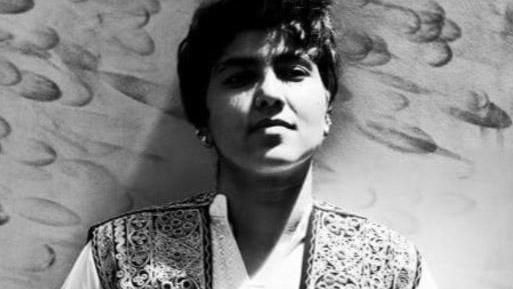On a sweltering afternoon, I sat kneeling by a low windowsill, chin cupped in my hand, staring out over the wide river plain behind our house. My mother had put me in a new dress, constellations of beads and silk threads embroidered all over the heavy fabric. From outside, I could hear rippling laughter as a group of boys played, running and kicking up clouds of dry dirt that blotted out my view of the serrated horizon.
There were ten of them at least, all dressed in loose clothes, kicking a soccer ball around between the low projections of rock. The ball zigzagged between their nimble feet and I panicked as I sat in the house, suddenly understanding my own fate as though reading my future in a book — embalmed for life in pretty clothes, doomed to either go to school or stay home. In that moment, my heart went to stone. There was no in-between for girls like me who wanted to run outside and play games and sports in the open air. Suddenly I was aware that, despite all of my liberal father’s efforts, his myths and big maps of the continents, and everything about the wider world he’d tried to teach me, I would never truly be free. In our culture girls remained indoors, quiet and veiled for life.
I didn’t think about what I did next. I simply got up, backed away from the sill into cool shadow, tearing off the dress, ripping at the seams, clawing at the arms. Then, in a quiet rampage through the house, I pulled every one of my dresses out of the closets and into the garden. One by one. They were so heavy, it took an entire hour. The cooking pit under the tree outside was shallow, just four bricks and a few sticks of wood set under a grill, but I knew where my mother kept the kerosene and matches. In a cabinet on a shelf in the kitchen. I moved fast, before I could change my mind, knowing full well that if I allowed myself to think too much, I would stop. Hauling down the full can of kerosene, I dragged it with both hands slowly across the floor without spilling so much as a drop, then out the back door, cutting a long track in the dirt leading straight to the pit. Staring at the stack, I hesitated for only a second: it was a shame to incinerate that beauty, and yet to ignore what I knew was to seal my own death sentence. I soaked the clothes in kerosene as clear as water and I struck a match. Standing back, I watched the flame fly at my command like a small shooting star…
My father stood there a long while, watching, though I hadn’t seen him, his gaze going from his wild, dancing child to the lifeless stack of dresses. I learned much later that on that hot afternoon, he’d seen another girl in me — the sister he’d failed to save so many years before. From an upstairs window, he’d glimpsed her figure hauling a pair of heavy galvanized buckets full of water across the family courtyard. Then she stopped suddenly and stood strangely still. He saw the first bucket drop, then the second. Spilled river water streamed over the hot stones as the buckets rolled past her feet, the hem of her dress dripping. He heard his sister gasp just once in pain and watched her body fall as though a bolt of lightning had struck her. By the time he got to her, she was on the ground, the clear sky reflected in the domes of her wide-open eyes. She was dead. His sister had been just like me — strong, androgynous, and hot-tempered. A tomboy simply could not survive in the cage our culture expected girls to live in.
By the time my father was a man he’d seen many girls die at their own hand to escape — cousins who poisoned themselves to avoid arranged marriages, others who simply stopped eating until they perished from hunger. Often girls doused themselves in kerosene before lighting a match. Once he’d watched a girl in the village go up like a human torch. When it was over, he’d seen what was left of her charred body.
“My sister was just like you, Maria — strong and different, born of the lion — and they would not let her be.” Then my father approached the burning pit and stepped up to me, laughing. He ran his fingers all through my massacred hair. “My new son must have a name befitting a great warrior and the battle just won without blood. We will call you Genghis Khan.” Then he leaned down and repeated the name into my left ear — and into my right, he recited the holy azan. And Maria was gone.
From the book A Different Kind of Daughter." Copyright (c) 2016 by Maria Toorpakai. Reprinted by permission of Twelve/Hachette Book Group, New York, NY. All rights reserved.
Every day, reporters and producers at The World are hard at work bringing you human-centered news from across the globe. But we can’t do it without you. We need your support to ensure we can continue this work for another year.
Make a gift today, and you’ll help us unlock a matching gift of $67,000!
